State of the art in benchmarking BigData systems
Frans Ojala: frans.ojala@helsinki.fi
Helsinki University
A standard or point of reference against which things may be compared.
A problem designed to evaluate the performance of a computer system.
Benchmark
/ˈbɛn(t)ʃmɑːk/
- Oxford dictionary
Benchmark
Premise 1: we need compute power, storage, network bandwidth etc. and it costs.
- How can we get the best system for the capital we have?
Premise 2: different vendors have different systems that have different properties.
- How can we compare the systems?
Why should we benchmark?
- CPU speed
- Disk I/O
- Memory I/O
- Network speed, latency
- Database throughput
- Application throughput
- Holistic system performance on load
Benchmark
What should be benchmarked?
Easy! Build an application that mimics the desired load and build a scoreboard!
Benchmark
How should we benchmark?
-
Introduction and motivation
-
A brief history of benchmarking
-
Case example in Cloud benchmarking: BigBench
-
Case example in ranking service providers: SMICloud
-
Summary of key concepts
-
Inudstry standards
Overview
A brief history of benchmarking
HPC
benchmarks
- HPCC (HPC Challenge) benchmark suite
- Floating point rate, double precision rate, memory bandwidth and latency, network capacity, random memory updates, discrete Fourier transform. LINPACK.
- Metrics are MFLOPS, Gb/s etc.
- SPEC benchmark suite
- A newer perspective that fixes some problems with HPCC.
- Measures elapsed time, claims to be fairer overall.
- Large set of programs to measure different aspects of HPC systems.
- TPC benchmarks
- Cover many aspects of traditional computing, such as typical business order-entry environment, data integration, decision support and others.
Database
benchmarks
- TPC-benchmarks (-A, -C, -D)
- Many solutions for business and e-commerce
- Mainly geared toward databases and transactions
- Wisconsin benchmark
- 'De facto' database benchmark for a long time
- Structured data
- XGDBench
- New benchmark for graph stores
- Addresses exascale cloud problems
- MAG: simulates real-world data
Cloud benchmarks
BigBench
- A result of the first Workshop for Big Data benchmarking.
- TPCx-BB uses BigBench for its BigData benchmark.
- 3 V's: Volume, Variety, Velocity;
- Arguably also 'Value'.
- End-to-end benchmark system:
- Fictious retailer as basis.
- Data model (3V).
- Data generator.
- Workload description (in english).
- Requires more work and industry input.
BigBench
Data Model
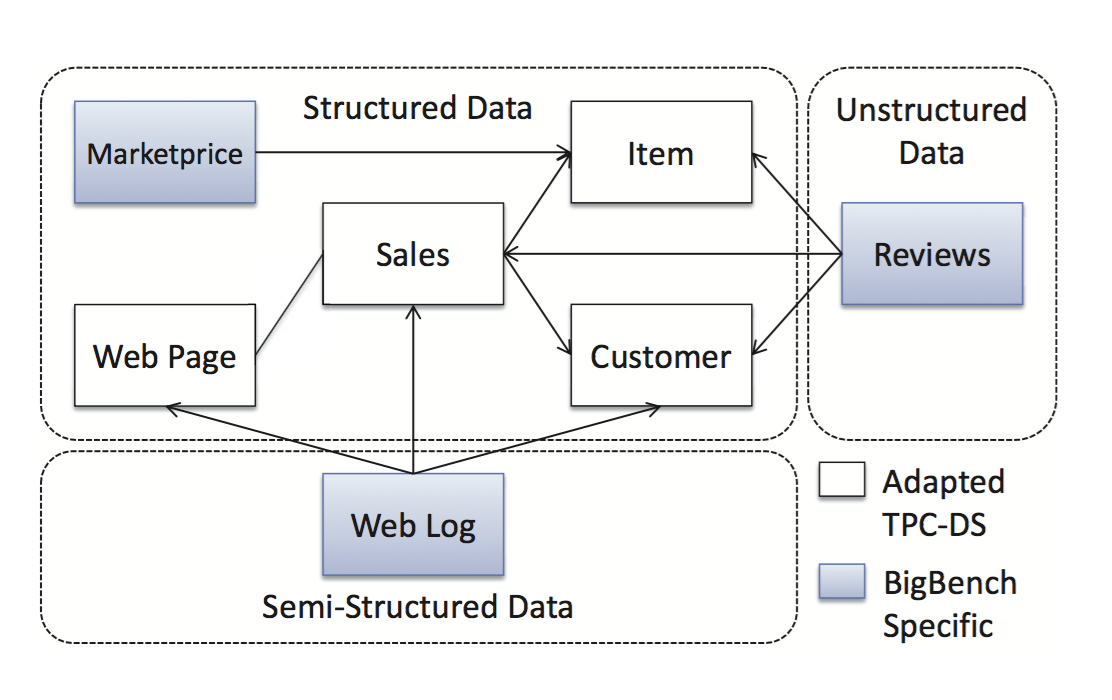
Ghazal, Ahmad, et al. "BigBench: towards an industry standard benchmark for big data analytics." Proceedings of the 2013 ACM SIGMOD international conference on Management of data. ACM, 2013.
- Structured:
- TPC-DS adaption
- Additionally a table for current competitor prices
- Relational data
- Semi-structured:
- Web-page navigation sequence
- Repeat customers and guests
- Key-value data
- Unstructured:
- User product reviews
BigBench
Data Generator
Rabl, Tilmann, et al. "A data generator for cloud-scale benchmarking." Performance Evaluation, Measurement and Characterization of Complex Systems. Springer Berlin Heidelberg, 2010. 41-56.
- Based on PDGF and its extension:
- Can generate large amount of data for arbitrary schema.
- Structured data from original PDGF.
- Semi-structured and unstructured data needs extensions.
- TextGen:
- Uses Markov chains to extract key words from input text.
- Builds a dictionary and uses its contents to build synthetic reviews.
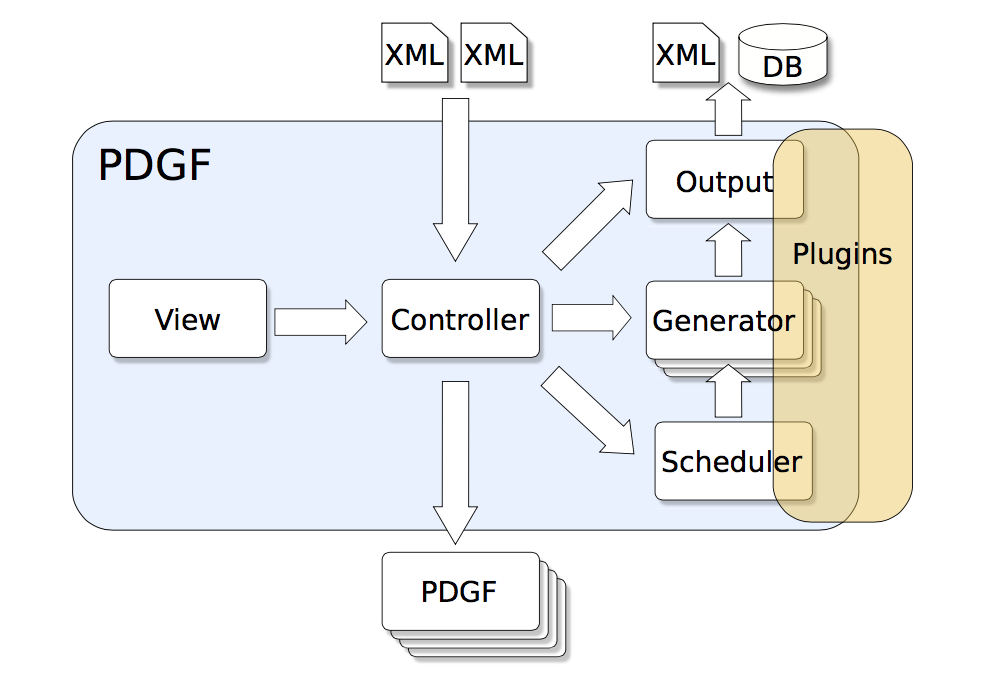
BigBench
Workload queries
- Workloads constructed from the enterprise point of view:
- Marketing
- Merchandising
- Operations
- Supply chain
- New businessa models
-
Also from technical point of view:
- Use mutliple data types in queries
- Declarative (SQL) and procedural (MR)
- Algorithmic data processing
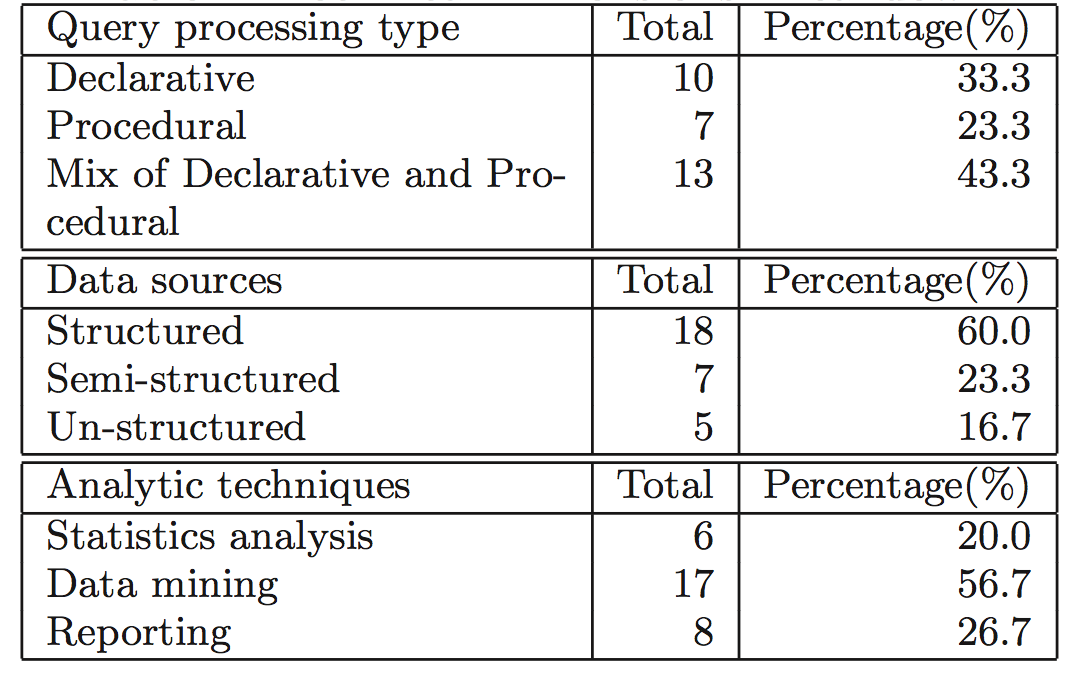
Ghazal, Ahmad, et al. "BigBench: towards an industry standard benchmark for big data analytics." Proceedings of the 2013 ACM SIGMOD international conference on Management of data. ACM, 2013.
Proposed metric:

BigBench
Ghazal, Ahmad, et al. "BigBench: towards an industry standard benchmark for big data analytics."
Proceedings of the 2013 ACM SIGMOD international conference on Management of data. ACM, 2013.
TPCx-BB: http://www.tpc.org/tpcx-bb/default.asp
Ranking service providers
SMICloud
- Framework proposed by Cloud Service Measurment Index Consortium to compare cloud providers.
- Offers evaluation based on user QoS requirements.
- How to measure various SMI attributes?
- How to rank service providers based on SMI attributes?
- Some SMI not easily quantified.
- What SMI to include?
- More SMI complicates Multi-Criteria Decision Making.
- Analytical Hierarchical Process to assign weights to SMI.
- Decision support tool!
SMICloud
Service Measurment Index
http://www.csmic.org
- Based on ISO standards' business-relevant KPI.
- Holistic view of the QoS requirements of a cloud customer.
- Catalogues service providers
- Monitors service providers
- Brokers with cloud customers
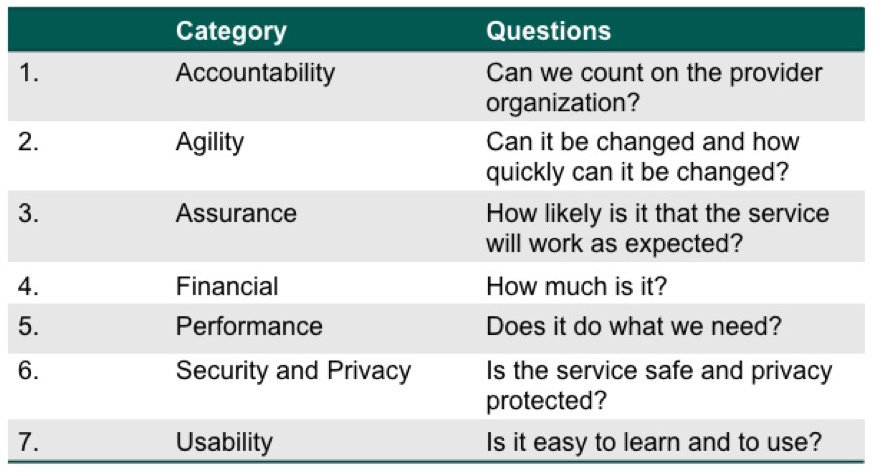
SMICloud
Key Perfomance Indicators
- Service response time
- Sustainability
- Suitability
- Accuracy
- Transparency
- Interoperability
- Availability
- Reilability
- Stability
- Cost
- Adaptability
- Elasticity
- Usability
- Throughput and efficiency
- Scalability
SMICloud
Garg, Saurabh Kumar, Steve Versteeg, and Rajkumar Buyya. "A framework for ranking of cloud computing services"
Future Generation Computer Systems 29.4 (2013): 1012-1023.
SMICloud: http://www.csmic.org
Summary of key concepts
Data generation
- Data used in benchmarking must be generated
- Network bandwidth insufficient
- Storage systems insufficient
- Empirical data not tailorable
- Methods
- On-the-fly
- A-priori
- Hybrid
- Generator must support wide data dynamics
- Able to address "4 V's"
Workloads
- Multiple types of workloads must be supported
- Premade suites
- Custom designed
- Platform independent
- Should support at least the most common APIs
- MapReduce, Spark, MongoDB, Cassandra...
- Enables more workloads
- Possible to holistically evaluate system
Metrics
- Systems have multiple dimensions
- Dimensions vary between applications
- Must support reporting of various properties
- No single numer can represent a system
- Users have different needs
- Need to be able to rank providers accordingly
- Needs multidimensional metrics
- Quality of Service is a important in the Cloud
- No single number can represent a system holistically
Differences between benchmarks
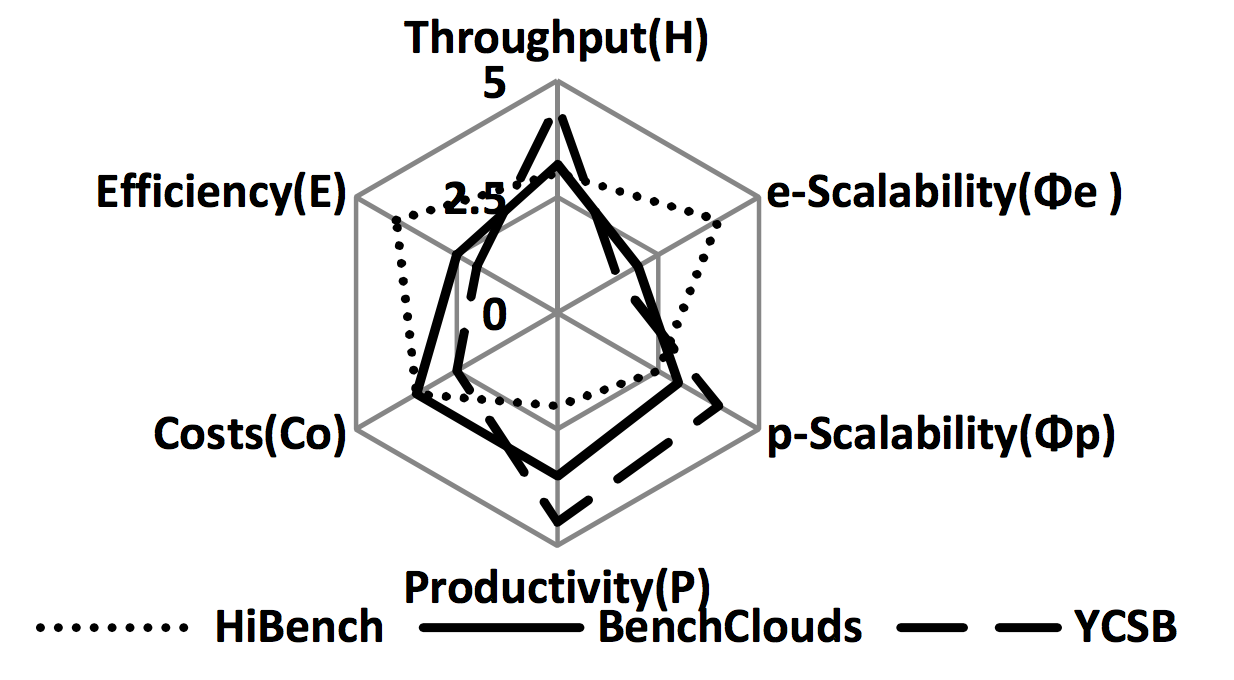
Hwang, Kai, et al. "Cloud Performance Modeling with Benchmark Evaluation of Elastic Scaling Strategies." Parallel and Distributed Systems, IEEE Transactions on 27.1 (2016): 130-143.
- Different benchmarks can achieve varying results
- Implementation details
- Programming model
- Programming language
- Data
- Workloads
Industry standard
(Does not exist yet)
Industry standards
- TCPx-HS, BB
- TPC has had several industry standard benchmarks
- PARSEC 2.0
- Version 1.0 was a de facto benchmark, now obsolete
- Has major overhauls, BigData approach, but still lacking
-
CloudHarmony
- Provides ranking services of different cloud providers
- Basis on CloudBench, CloudProbe
- CloudSpectator
- Basis on UnixBench, Phoronix test suite, others
- Current top google result for 'Cloud benchmarking'
Sources
Sources
- BigBench
- Ghazal, Ahmad, et al. "BigBench: towards an industry standard benchmark for big data analytics." Proceedings of the 2013 ACM SIGMOD international conference on Management of data. ACM, 2013.
-
SMICloud
- Garg, Saurabh Kumar, Steve Versteeg, and Rajkumar Buyya. "SMICloud: a framework for comparing and ranking cloud services." Utility and Cloud Computing (UCC), 2011 Fourth IEEE International Conference on. IEEE, 2011.
-
TPC, see associated documentation
- http://www.tpc.org
- Others: ask, and I shall provide
Questions?
Comments?
More details on benchmarks
HPCC
- Linpack TPP benchmark measures floating point rate of execution for linear equations.
- Floating point rate of execution of double precision real matrix-matrix multiplication.
- Synthetic benchmark program to measure sustainable memory bandwidth and the corresponding computation rate for simple vector kernel.
- Parallel matrix transpose for measuring network capacity.
- Measures the rate of integer random updates of memory (GUPS).
- Measures the floating point rate of execution of double precision complex one-dimensional Discrete Fourier Transform (DFT).
- Communication bandwidth and latency.
SPEC CPU
Dixit, Kaivalya M. "Overview of the SPEC Benchmarks." (1993): 489-521.
LINPACK
- Collection of subroutines written in Fortran to solve systems of linear equations (matrix operations).
- Measures double precision floating point performance.
- Widely used and is the standard benchmark in ranking "top500" supercomputers.
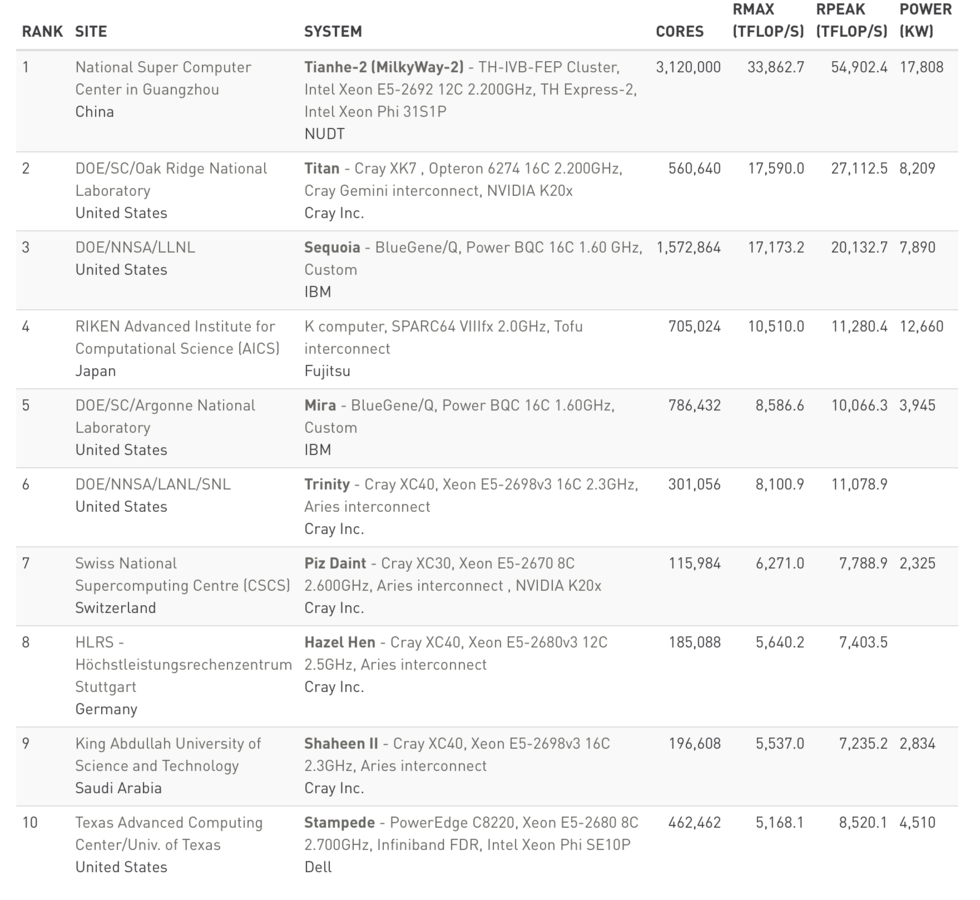
LINPACK problems
-
Small, fit in cache
-
Obsolete instruction mix
-
Uncontrolled source code
-
Prone to compiler tricks
-
Short runtimes on modern machines
-
Single-number performance characterization with a single benchmark
-
Difficult to reproduce results (short runtime and low-precision UNIX timer)
NAS parallel benchmarks
- Small set of programs designed to help evaluate the performance of parallel supercomputers.
- Basis in computational fluid dynamics (CFD) applications and consist of five kernels and three pseudo-applications in the original "pencil-and-paper" specification (NPB 1).
- Has been extended to include new benchmarks for unstructured adaptive mesh, parallel I/O, multi-zone applications, and computational grids.
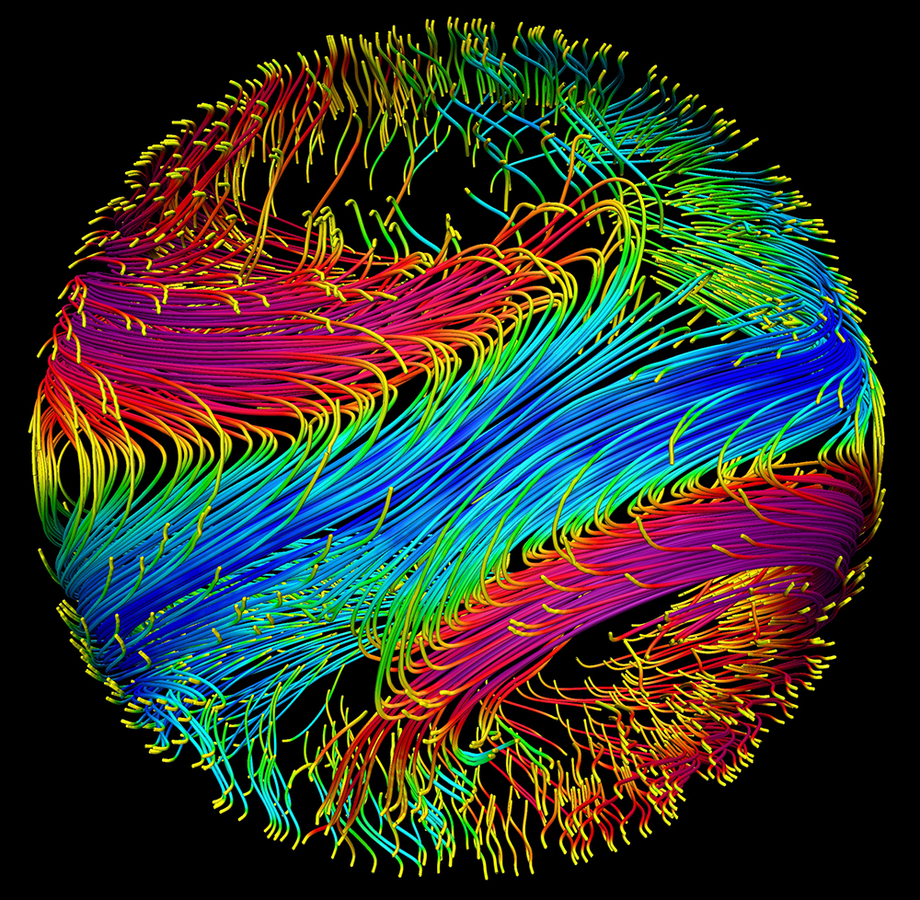
Courtesy of NASA, NAS: https://www.nas.nasa.gov/publications/gallery.html
More cloud benchmarks
- AMP benchmarks
- LinkBench
- Cloud Suite
- CloudCmp
- CloudBench
- Cloudstone
- C-SMART
- ... the list goes on